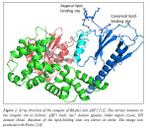Stefan Szedlacsek, Dr.

Group: Enzymology
Department: EnzymologyHead of Department
Currently working on
Department of Enzymology .
Biography
Prof. Dr. Stefan Szedlacsek is the Head of the Enzymology Department at the Institute of Biochemistry of the Romanian Academy. He holds a PhD degree in Biotechnology from Polytechnical University of Bucharest as well as a MSc in Organic Synthesis (Polytechnical University, Bucharest) and MSc in Mathematics (University of Bucharest). As a visiting scientist, he performed research in the field of cholesterol metabolism at the University of Illinois at Urbana-Champaign (USA), where he succeeded to evidence a new pathway in the metabolism of oxysterols.
He is an “Alexander von Humboldt” fellow and worked in Germany, in the Institute of Biochemistry (Kiel University), Max-Plack Institute for Physiological Chemistry (Dortmund) and Max-Planck Institute for Biophysics (Frankfurt).
Between August 2022-February 2023, he was a Fulbright Visiting Scholar at MD Anderson Cancer Center- University of Texas, Department of Leukemia, where his research title was “Biochemical and cellular investigations regarding the potential use of affibodies in leukemia therapy” (Grant no:779/06.06.2022).
He has supervised numerous PhD and master’s theses. Together with his group, he participated as Principal Investigator/Group Leader in the Marie Curie Research Training Networks - PTPNET; MRTN-CT- 2006-035830 (FP6), financed by the European Community. Also, he received a „P-CUBE TNA Project” Fellowship (FP 7- EU) from Oxford University (United Kingdom). Professor Szedlacsek was Project Coordinator for research consortia within a number of projects financed by the Romanian Research Authority.
Together with his group, he is dedicated to the study of structure-function relationships in the enzymes involved in cell signaling, especially in the protein tyrosine phosphatases (PTP). He succeeded to solve the first crystal structure of a member of KIM-containing family of PTP, evidenced that MAM domain of receptor PTPμ promotes lateral dimerization, identified molecular determinants of PRL3, a molecular marker of various cancer forms and solved the crystal structure of xylulose-5 phosphate phosphoketolase. Several years ago, he reported identification of WDR1 as a novel substrate of EYA3 PTP and proved that WDR1 dephosphorylation modulates the actin cytoskeleton.
Papers
-
. "Mn(II)-based diagnostic agents: from basic research to targeted diagnostic procedures", Scientia et Securitas 5(2): 253-266, (2024)
doi: https://doi.org/10.1556/112.2024.00208
-
. "Synthesis and characterization of a novel [52Mn]Mn-labelled affibody based radiotracer for HER2+ targeting", Inorganic Chemistry Frontiers, (2023)
doi: 10.1039/D3QI00356F
IF: 7.78AI: 1.01 -
. "Designed Peptide Inhibitors of STEP Phosphatase-GluA2 AMPA Receptor Interaction Enhance the Cognitive Performance in Rats", JOURNAL OF MEDICINAL CHEMISTRY 1520-4804(ISSN 0022-2623): 217–233, (2022)
doi: 10.1021/acs.jmedchem.1c01303
IF: 7.45AI: 1.58 -
. "Trojan horse treatment based on PEG-coated extracellular vesicles to deliver doxorubicin to melanoma in vitro and in vivo", Cancer biology & therapy 23(1): 1-16, (2022)
doi: 10.1080/15384047.2021.2003656
IF: 4.74 -
. "Regulation of TRPM8 channel activity by Src-mediated tyrosine phosphorylation", Journal of Cellular Physiology 235(6): 5192-5203, (2020)
IF: 4.52AI: 1.50 -
. "Biological and molecular modifications induced by cadmium and arsenic during breast and prostate cancer development", Environ Res 178: 108700, (2019)
IF: 5.03 -
. "Analysis of EYA3 Phosphorylation by Src Kinase Identifies Residues Involved in Cell Proliferation", International Journal of Molecular Sciences 20(24): 6307, (2019)
IF: 4.18 -
. "Crystal structure of a xylulose 5-phosphate phosphoketolase. Insights into the substrate specificity for xylulose 5-phosphate", Journal of Structural Biology 207(1): 85-102, (2019)
IF: 3.75 -
. "Collagen regulates the ability of endothelial progenitor cells to protect hypoxic myocardium through a mechanism involving miR-377/VE-PTP axis", Journal of cellular and molecular medicine 22(10): 4700-4708, (2018)
IF: 4.66 -
. "WDR1 is a novel EYA3 substrate and its dephosphorylation induces modifications of the cellular actin cytoskeleton", Scientific reports 8(1): 2910, (2018)
-
. "Expression, Purification, and Kinetic Analysis of PTP Domains", Methods in molecular biology (Clifton, N.J.) 1447: 39-66, (2016)
-
. "Phosphoketolases from Lactococcus lactis, Leuconostoc mesenteroides and Pseudomonas aeruginosa: Dissimilar sequences, similar substrates but distinct enzymatic characteristics", Applied Microbiology and Biotechnology 18(98): 7855-67, (2014)
IF: 3.34 -
. "Analysis of molecular determinants of PRL-3", Journal of cellular and molecular medicine 13(9B): 3141-50, (2009)
AI: 1.70 -
. "Expression, Purification, and Kinetic Analysis of PTP Domains", pp 39- 66, Protein Tyrosine Phosphatases, Rafael Pulido, (2016).
ISBN: 978-1-4939-3744-8 -
. "Time-Dependent or Steady-State Control of Metabolic Systems?", pp 251-258, Technological and Medical Implications of Metabolic Control Analysis, A.Cornish-Bowden and M.L.Cardenas, NATO Science Series, 3.High Technology, (2000).
ISBN: 978-94-011-4072-0 -
. "Kinetics of slow and tight-binding inhibitors", pp 144-180, Fundamentals of Enzyme Kinetics, Revised edition by Athel Cornish-Bowden, ACADEMIC PRESS INC, 525 B STREET, SUITE 1900, SAN DIEGO, CA 92101-4495, (1995).
ISBN: 1855780720
Grants
The main idea of this project was that by inhibiting at least one of these two interactions of GluA2, the internalization of AMPAR will be reduced and therefore the synapse resistance will be increased, thus leading to improved cognitive functions.

The project is agreed as a bilateral collaboration between IBAR and ATOMKI, and the University of Debrecen and IFIN-HH participate in this project voluntarily.
The project is agreed as a joint collaboration among IBAR, ATOMKI and UD, the latter being a cost free participant. There are two main directions envisaged by the proposed project: - receptors mapping and therapy, using an affibody against HER2 receptors, combined with an adequate radioisotope. In this respect, the specific objectives are: a) expression and purification of affibodies; b) establishing labelling procedures; c) ex vivo and/or in vivo testing of optimal compounds.
Affibody molecules are highly promising therapeutic candidates due to their advantageous features like: small size, efficient delivery, straightforward engineering towards improved formats, site-directed conjugation of payloads, possibility of GMP production by chemical synthesis or inexpensive bacterial production leading to low product costs.
Project Funded under: Human resources and Mobility in the specific programme for research, technological development and demonstration "Structuring the European Research Area" under the Sixth Framework Programme 2002-2006. PTPNET was a Training Network for young scientists in the field of protein tyrosine phosphatase (PTP) research.
Proteins are essential players of all biological processes and they are involved in practically every function performed by a living cell.
The Alexander von Humboldt Foundation promotes academic cooperation between foreign and German researchers at the highest level. Each year, the Foundation awards more than 700 research fellowships and awards to support researchers from abroad who come to Germany to work on a research project together with German researchers at a host institute. The research topic is chosen by the applicant.
The Deutsche Forschungsgemeinschaft (DFG, German Research Foundation) is the most important independent research funding organisation in Germany. It supports both scientific and humanistic studies and aims to promote top-level research in various disciplines at universities and research institutions. The main focus is on funding projects proposed by the scientific community, with an emphasis on knowledge-driven research.
Proteins are the most important functional units of living matter: all cellular processes are governed by specific proteins possessing highly specialized functional roles. Understanding the intimate mechanisms of cell functions necessitates a detailed knowledge of the 3D-structure of proteins.
One of the most powerful techniques in modern biomedical research is the determination of the three dimensional structure of proteins. This project proposes to establish a laboratory for 3D protein structure determination using X-ray diffraction experiments.
Protein tyrosine phosphatases (PTPs) are fundamental regulatory enzymes that dephosphorylate phosphotyrosine residues and are essential components of intracellular signalling pathways in both normal and pathological conditions. There is experimental evidence that disruption of the phosphatase activity of many PTPases is involved in the pathogenesis of several congenital or acquired diseases, including diabetes, cancer, infections, autoimmune, neuronal and cardiovascular diseases.
The project focuses on characterizing the branchio-oto-renal (BOR) syndrome, an autosomal dominant genetic disorder caused by mutations in the EYA gene. The goal is to enzymatically analyze the conserved C-terminal domain of the Eya3 protein and identify physiological substrates to better understand the molecular mechanisms involved in this syndrome.
Cancer causes 1.5 million deaths a year in Europe, accounting for a quarter of all deaths. The incidence of cancer is increasing, with 20 million new cases and 10 million deaths expected in the next 20 years. Approximately 90% of deaths are due to metastases rather than primary tumours. Genetic mutations and genomic instability allow tumour cells to invade and form metastases.
This project aims to develop a highly efficient enzyme for the conversion of xylose from cellulosic wastes into high-value biosynthetic intermediates. By optimising the catalytic efficiency of phosphoketolase and designing an enzymatic reactor, the project aims to provide a sustainable method of utilising lignocellulosic residues.
 Romanian Academy
Romanian Academy